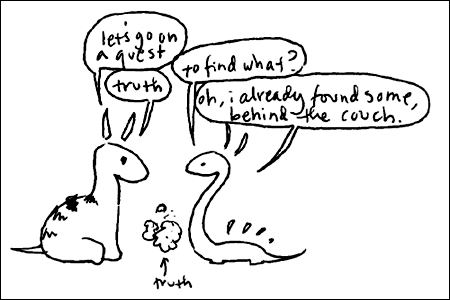All sorts of people
and disciplines try to define what is “real” in the world. Science is after “the truth” as much as
religion is. But study science or study
religion and you’ll see that “the truth” changes over time. You realize that what we thought was real –
what once was fact centuries ago is now considered ridiculous by modern
standards.
This theme resonates
throughout literature, but especially in the world of Michael Crichton. He’s the guy that wrote Jurassic Park, Timeline,
and the Andromeda Strain. His novels
combine science with philosophy; writing fantasy that seems so real and so
true.
One of my favorite
passages comes from The Lost World.
It concerns Jack Thorne, a materials engineer who specializes in
building field equipment, vehicles, and weaponry for scientists all over the
world. In this particular section, he’s
speaking to Kelly Curtis, a young woman fascinated by science. In talking about some detailed scientific
theories, he says to her:
"Are you listening to all that?" Thorne said.
"I wouldn't take any of it too seriously. It’s just theories. Human beings
can't help making them, but the fact is that theories are just fantasies. And
they change. When America was a new country, people believed in something
called phlogiston. You know what that is? No? Well, it doesn't matter, because
it wasn't real anyway. They also believed that four humors controlled behavior.
And they believed that the earth was only a few thousand years old. Now we
believe the earth is four billion years old, and we believe in photons and
electrons, and we think human behavior is controlled by things like ego and
self-esteem. We think those beliefs are more scientific and better."
"Aren't they?" [Kelly asks.]
Thorne shrugged. "They're still just fantasies. They're
not real. Have you ever seen a self-esteem? Can you bring me one on a plate?
How about a photon? Can you bring me one of those?"
Kelly shook her head. "no, but . . ."
"And you never will, because those things don't exist.
No matter how seriously people take them," Thorne said.
"A hundred years from now, people will look back at us
and laugh. They'll say, 'You know what people used to believe? They believed in
photons and electrons. Can you imagine anything so silly?' They'll have a good
laugh, because by then there will be newer and better fantasies." Thorne
shook his head. "And meanwhile, you feel the way the boat moves? That's
the sea. That's real. You smell the salt in the air? You feel the sunlight on
your skin? That's all real. You see all of us together? That's real. Life is
wonderful. It's a gift to be alive, to see the sun and breathe the air. And there
isn't really anything else.”
Crichton writes about science, he obviously believes in its
value. And so do I. Scientific discovery
is exciting and essential. It heals
people; technology helps us communicate, machines make living easy or possible;
science explains our natural world and our bodies, helping us to make healthy
decisions. It’s vital.
Crichton’s reminder is important though. We can’t lose track of what’s real: our
emotions, the rhythm of nature, the way we humans need one another.
These are the
constants. As Maimonides wrote: “Truth
does not become more true by virtue of the fact that the entire world agrees
with it, nor less so even if the whole world disagrees with it.” It’s still truth, whether we call it that or
not.
Truth. We may
perceive it, we may not, but it’s there somewhere. Sometimes we discover it,
sometimes we ignore it. A lot like God.
God is that constant. God is that
reality. God is that Truth.
May we try to happen upon that Truth, to
open ourselves to our most basic joys and tranquil experiences and to discover
what is most real.


No comments:
Post a Comment